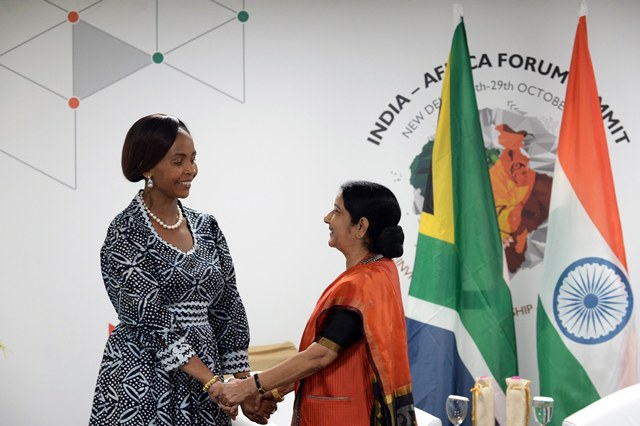
NEW DELHI: Even as India woos the world with its Make in India programme, South Africa wants Indian firms to manufacture in the country, South African International Relations and Cooperation Minister Maite Nkoana Mashabane said here.
In New Delhi for the India-Africa Forum Summit (IAFS), Mashabane said South Africa wanted to enhance economic partnership with India in a way that was mutually beneficial for both the countries.
“As much as Make in India, also we can Make in South Africa, as long as it is in partnership and mutually beneficial,” Mashabane, a former South African ambassador in India (1999-2005), told IANS in response to a question on what kind of cooperation South Africa was looking forward to with India.
Mashabane said South Africa wants to benefit from its natural resources and attain the poverty alleviation goals as per Agenda 2063 of the African Union.
“When we say we want to process our raw materials… we have the raw material, but we need to work on skilling our people,” she said.
“To know when we talk about seven most important aspirations of Agenda 2063, you know that people cannot come from somewhere, take our raw material and leave us even without the basic knowledge. So we want industrialisation which is skill-based and we will encourage many Indian companies for partnership,” she said.
Stressing that the two nations should build on their historical ties, she said South Africa felt Mahatma Gandhi belongs to it as much as he belongs to India.
“India’s place in the world has been determined by Mahatma Gandhi. He is Mahatma Gandhi of South Africa as much as he is Mahatma Gandhi of India,” she said.
The minister also pointed out that she has lived in India for five and a half years, and loves the country.
She said both the countries had several things in common, including the “history, joint struggle against colonialism, joint struggle of non-occupation, freedom, values of respect of law, and respect of human rights”.
“We have proven to the world that democracy and development can go together,” she said.
She, however, added that the two developing nations now needed to build on their economic relations.
“People cannot eat just democracy, they need bread on the table. Our focus would be the dynamism, strengthening of our economic ties in line with the agenda of the African union,” she said, when asked about the expected outcome from the summit.
She said Africa, along with other developing countries and China, should act to prioritise poverty eradication.
“We want India, Africa, other developing countries, plus China, to make sure that we transcend the MDG (millennium development goal) to sustainable development goals … that we still prioritise poverty eradication,” she said.
Asked about joining hands with India on the climate change agenda, the minister said the principle of “common but differentiated responsibility” cannot be overlooked.
“We will want, together with India and other members, to make sure the outcome of COP 21 is really based on the very simple principle of a common but differentiated responsibility”.
“We also are aware now that the issues of climate change are also equally a development issue. But above all it is about the economy; so we will defend what is important for us,” she added.
The bilateral trade between India and South Africa currently stands at US$15 billion and both the countries are trying to take it beyond US$20 billion by 2018.
India and South Africa historically share friendly terms with common icons like Mahatma Gandhi and Nelson Mandela who are revered in both the countries. People of Indian origin account for almost 2.5 per cent of the country’s population with Durban having the highest concentration of the community.